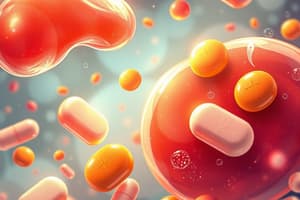Podcast
Questions and Answers
Which of the following conditions is NOT a clinical use for thrombolytic drugs?
Which of the following conditions is NOT a clinical use for thrombolytic drugs?
- Deep vein thrombosis
- Chronic venous insufficiency (correct)
- Acute myocardial infarction
- Acute ischemic stroke
What is the primary reason for the limited use of thrombolytic drugs?
What is the primary reason for the limited use of thrombolytic drugs?
- Ineffectiveness in severe cases
- Their high cost
- Their tendency to cause bleeding (correct)
- Rapid metabolism in the body
Which of the following is a common cause of inadequate blood clotting?
Which of the following is a common cause of inadequate blood clotting?
- Increased platelet production
- Elevated blood pressure
- Hemoconcentration
- Vitamin K deficiency (correct)
Which group is most commonly associated with Vitamin K deficiency?
Which group is most commonly associated with Vitamin K deficiency?
What factor is primarily indicated in hemophilia A?
What factor is primarily indicated in hemophilia A?
Which of the following treatments is used for Vitamin K deficiency?
Which of the following treatments is used for Vitamin K deficiency?
What is the lifespan of inhibition of platelet aggregation after Aspirin administration?
What is the lifespan of inhibition of platelet aggregation after Aspirin administration?
Which adverse effect is associated with high doses of Aspirin?
Which adverse effect is associated with high doses of Aspirin?
What is the mechanism of action of Clopidogrel?
What is the mechanism of action of Clopidogrel?
Which condition is NOT a therapeutic use of Aspirin?
Which condition is NOT a therapeutic use of Aspirin?
Which of the following statements regarding platelet action is true?
Which of the following statements regarding platelet action is true?
Which medication has more pronounced effects on prolonging bleeding time?
Which medication has more pronounced effects on prolonging bleeding time?
What is the function of Abciximab in platelet aggregation?
What is the function of Abciximab in platelet aggregation?
Which of the following is a characteristic of Clopidogrel's therapeutic use?
Which of the following is a characteristic of Clopidogrel's therapeutic use?
What is the primary mechanism by which Low-Molecular Weight Heparins (LMWHs) function?
What is the primary mechanism by which Low-Molecular Weight Heparins (LMWHs) function?
Which of the following therapeutic uses is NOT appropriate for Heparin or LMWHs?
Which of the following therapeutic uses is NOT appropriate for Heparin or LMWHs?
What is the recommended method to monitor the anticoagulant activity of Heparin?
What is the recommended method to monitor the anticoagulant activity of Heparin?
Which of the following statements is true regarding the use of LMWHs?
Which of the following statements is true regarding the use of LMWHs?
Which of the following is an adverse effect of Heparin and LMWHs?
Which of the following is an adverse effect of Heparin and LMWHs?
What is the molecular weight range for Low-Molecular Weight Heparins (LMWHs)?
What is the molecular weight range for Low-Molecular Weight Heparins (LMWHs)?
What is the mechanism of action of Direct thrombin inhibitors like Dabigatran?
What is the mechanism of action of Direct thrombin inhibitors like Dabigatran?
Which of the following is a hallmark of Heparin-induced thrombocytopenia (HIT)?
Which of the following is a hallmark of Heparin-induced thrombocytopenia (HIT)?
What is the primary therapeutic use of Warfarin?
What is the primary therapeutic use of Warfarin?
What is a common side effect associated with the use of Rivaroxaban?
What is a common side effect associated with the use of Rivaroxaban?
Which antidote is used for the side effects of Warfarin?
Which antidote is used for the side effects of Warfarin?
Which drug selectively binds to antithrombin III to increase the neutralization of factor Xa?
Which drug selectively binds to antithrombin III to increase the neutralization of factor Xa?
What is a common characteristic of thrombolytic drugs such as Streptokinase and Alteplase?
What is a common characteristic of thrombolytic drugs such as Streptokinase and Alteplase?
What condition is associated with the immune-mediated response to Heparin?
What condition is associated with the immune-mediated response to Heparin?
What is the primary treatment goal for managing elevated cholesterol levels?
What is the primary treatment goal for managing elevated cholesterol levels?
Which factor does NOT influence the specific target levels for LDL cholesterol reduction?
Which factor does NOT influence the specific target levels for LDL cholesterol reduction?
Which of the following is a risk factor for atherosclerosis?
Which of the following is a risk factor for atherosclerosis?
What initiates the plaque formation in atherosclerosis?
What initiates the plaque formation in atherosclerosis?
What is the consequence when a narrowed blood vessel becomes clogged?
What is the consequence when a narrowed blood vessel becomes clogged?
What is the potential reduction in atherosclerosis-induced mortality with appropriate diet and drug treatment?
What is the potential reduction in atherosclerosis-induced mortality with appropriate diet and drug treatment?
Which of the following is NOT a major plasma lipoprotein involved in atherosclerosis?
Which of the following is NOT a major plasma lipoprotein involved in atherosclerosis?
What primarily begins the transformation of cells into foam cells in atherosclerosis?
What primarily begins the transformation of cells into foam cells in atherosclerosis?
Flashcards are hidden until you start studying
Study Notes
Lipid-Lowering Agents
- Elevated cholesterol levels can stem from lifestyle choices, inherited gene defects, or a mix of both factors.
Treatment Goals
- Primary aim is to reduce LDL cholesterol levels.
- Recommendations for target LDL levels depend on the presence of coronary heart disease (CHD) and additional cardiac risk factors.
- Higher heart disease risk correlates with more aggressive LDL-lowering therapy.
Atherosclerosis
- Major contributor to mortality in the U.S., often leading to heart attacks and strokes.
- Key risk factors include hypertension, obesity, diabetes, high-fat diet, smoking, stress, low HDL levels, lack of exercise, and family history of atherosclerosis.
- Elevated plasma lipoproteins like VLDL, IDL, and LDL significantly contribute to disease development.
- Injury to blood vessel endothelium allows LDL and platelets to infiltrate, leading to plaque formation and vessel obstruction.
Pathogenesis of Atherosclerosis
- Oxidized LDL is internalized by cells, leading to foam cell formation.
- Cell death and plaque buildup can cause blood vessel blockage, resulting in strokes or heart attacks.
- Effective dietary choices and pharmacological interventions can reduce atherosclerosis-related mortality by 20-40%.
Aspirin (Acetylsalicylic Acid)
- Used prophylactically for transient cerebral ischemia and prevention of myocardial infarction (MI).
- Increases bleeding time, raising the risk of hemorrhagic strokes and gastrointestinal bleeding.
Antiplatelet Agents (Clopidogrel, Ticagrelor)
- Block P2Y ADP receptors on platelets, crucial for platelet activation.
- Clopidogrel is used to prevent thrombosis from atherosclerotic events, acute coronary syndrome, and during percutaneous coronary interventions.
- These medications can prolong bleeding time, with no available antidote.
GP IIb/IIIa Inhibitors
- Abciximab blocks GP IIb/IIIa receptors, preventing fibrinogen and von Willebrand factor binding, which may lead to hematoma formation with intramuscular administration.
Low-Molecular Weight Heparins (LMWHs)
- Enoxaparin has a molecular weight between 2000-6000 and a longer action duration (3-12 hours) with subcutaneous administration.
- Inactivates clotting factors IIa and Xa, providing immediate anticoagulant activity.
- Common uses include treatment of acute venous thrombosis (DVT & PE), post-operative thrombosis prophylaxis, and acute MI management.
Heparin & LMWH Adverse Effects
- May cause bleeding, requiring immediate intervention with protamine sulfate.
- Hypersensitivity reactions can occur due to the drug's porcine origin.
- Heparin-induced thrombocytopenia (HIT) is an immune-mediated condition that increases the risk of embolism.
FondaparinuX
- A small synthetic drug that selectively binds antithrombin III, enhancing neutralization of factor Xa; indicated for DVT and PE treatment/prevention.
Direct Thrombin Inhibitors
- Dabigatran etexilate directly inhibits thrombin, preventing fibrin generation.
Factor Xa Inhibitors
- Rivaroxaban directly inhibits factor Xa and is taken orally; used for DVT, PE, and stroke prevention with bleeding as a notable side effect.
Warfarin (Coumarin Anticoagulants)
- A potent anticoagulant with a narrow therapeutic window, necessitating continuous INR monitoring.
- Mechanism includes inhibiting vitamin K reactivation and liver synthesis of clotting factors.
- Prescribed for DVT, PE, thromboembolism prophylaxis during surgeries, and conditions like atrial fibrillation.
Warfarin Side Effects
- Risk of bleeding, monitored by INR, with vitamin K as an antidote; congenital effects raise safety concerns in pregnant patients.
Thrombolytic Drugs (Streptokinase, Alteplase)
- Facilitate plasminogen to plasmin conversion, dissolving clots for acute thrombosis treatment; most effective within 2-6 hours of event onset.
- Risk of bleeding is a significant limitation to their use.
Inadequate Blood Clotting Causes
- Vitamin K deficiency, genetic mutations (Hemophilia A and B), drug-induced factors, or thrombocytopenia can result in insufficient clot formation.
Vitamin K Deficiency
- Commonly seen in the elderly, newborns, and associated with dietary deficiencies or antimicrobial therapy.
Treatment of Vitamin K Deficiency
- Managed via oral or parenteral administration of phytonadione (vitamin K).
Studying That Suits You
Use AI to generate personalized quizzes and flashcards to suit your learning preferences.



